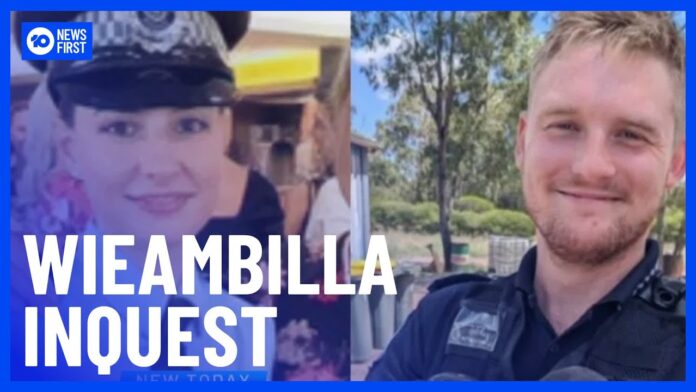Constable Randall Kirk, who survived a deadly ambush in rural Queensland, is set to provide crucial testimony at the inquest into the shooting that claimed the lives of two officers
Constable Randall Kirk, the sole survivor of a harrowing police ambush in Wieambilla, Queensland, will testify at a coronial inquest beginning Tuesday. The inquest seeks to uncover details about the tragic shooting that occurred on December 12, 2022, when Kirk and three fellow junior officers responded to a missing persons inquiry in the rural area northwest of Brisbane.
During the afternoon of the incident, Constables Matthew Arnold and Rachel McCrow were ambushed and killed by Nathaniel and Gareth Train as they walked along a dirt driveway on the Train property. Kirk, who was also targeted, managed to survive the ordeal by taking cover behind trees. His actions included firing back at the attackers before eventually fleeing in his police vehicle.
The inquest, overseen by State Coroner Terry Ryan, began with the presentation of Kirk’s body-worn camera footage. This footage showed Kirk’s desperate attempt to defend himself and report the incident as it unfolded. Kirk’s harrowing experience included multiple attempts to evade gunfire while contacting his station to report that officers had been shot.
The Train brothers, along with their wife Stacey, were killed by specialist police approximately six hours after the initial ambush. The Trains had previously murdered their neighbor, Alan Dare, who had approached the property to investigate the commotion. The Trains’ actions were later described by Queensland Police as a “religiously motivated terrorist attack,” driven by their belief in the imminent end of the world as taught by their fundamentalist Christian ideology.
Constable Keely Brough, another officer at the scene, narrowly escaped detection by the Trains, hiding in grass and avoiding a fire they had lit to flush her out. Backup arrived two hours later, providing much-needed relief and safety.
Kirk’s testimony is expected to be a critical component of the five-week inquest, shedding light on the events of that fateful day and the broader implications for police operations and public safety in Queensland.
Analysis
Political
The Wieambilla shooting and subsequent inquest highlight broader concerns about policing and public safety in Queensland and Australia at large. The tragic event underscores the risks faced by law enforcement officers, particularly when confronting individuals motivated by extreme ideologies. Politically, the inquest might influence discussions around police training, response protocols, and the need for improved safety measures. The handling of such incidents may affect public trust in law enforcement and shape future policy decisions regarding police operations and community safety.
Social
Socially, the inquest into the Wieambilla shooting brings to the forefront the issue of extremism and its impact on communities. The Trains’ motivations and the violence they enacted reflect broader societal challenges related to radicalization and religious extremism. The incident raises questions about the social support systems in place to identify and intervene in cases where individuals may pose a threat to public safety. Additionally, the trauma experienced by the survivors and the families of the victims highlights the emotional and psychological impact of such violence on the community.
Racial
While the Wieambilla shooting was not directly related to racial issues, the inquest may intersect with broader discussions about how different communities are affected by violent extremism. In Australia, as in many countries, there is an ongoing dialogue about how extremism manifests across various social and racial groups. The case may prompt further examination of how law enforcement addresses threats and ensures the safety of all communities, regardless of their background.
Gender
The inquest also touches upon gender dynamics, particularly in the context of law enforcement and violence. Constable Rachel McCrow, one of the victims, was a female officer who faced the same risks as her male counterparts. The focus on Kirk’s and Brough’s experiences highlights the challenges faced by both male and female officers in high-risk situations. The visibility of female officers in such contexts may influence discussions about gender equality and representation within the police force.
Economic
The economic implications of the Wieambilla shooting and inquest are tied to the costs associated with responding to and managing such high-profile incidents. The expenses related to police operations, legal proceedings, and the potential need for increased security measures can strain public resources. Additionally, the inquest may influence budgetary decisions related to police funding and support services, reflecting the economic impact of maintaining public safety and addressing the aftermath of violent events.
